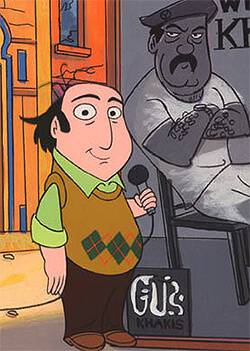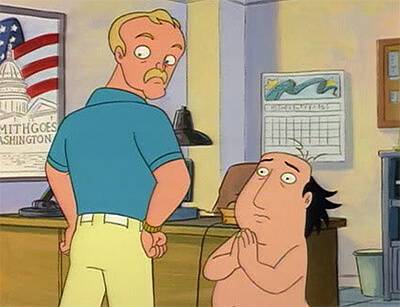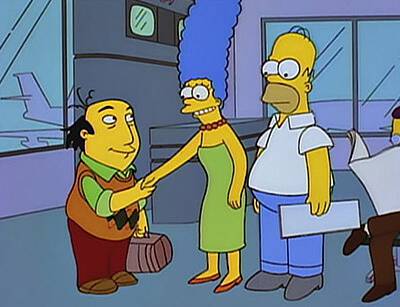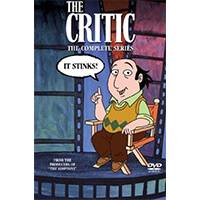Retro Ramblings – The Critic
As DVD boxsets are about five seconds away from disappearing altogether, I should probably act quick as far as sharing any reminiscences on their value. Of course, this value has had many facets – lining up a bunch of them on a shelf to sate that certain percentage of completist OCD we’re each afforded (if, for example, I only owned the good episodes of Red Dwarf the spines would spell out ‘RE DWA’, which is simply unacceptable. The bastards got me). This pretty much went hand-in-hand with their consumer value; adorable as it seems , in their early years owning DVDs was almost considered a status symbol. Less discussed, however, is their medicinal value, as something you could prescribe yourself on a day when leaving the house or mingling with the normals was too much effort. It was how we binged-watched in a pre-Netflix world, often having to wait years or decades for entire seasons of a beloved show to be commercially available. Of course there had been VHS releases at the time, through which us young’uns were treated to such glorious excess of maybe a four-episode compilation every six months. Truly they were impoverished times. We also had to walk to the mines every morning. Through the snow. Where we were simultaneously whipped and taught Latin. Pity and respect me.
 So the advent of DVD essentially began mankind’s impulse to eschew weekly, episodic viewing, in favour of chugging down our content in excess, supplemented by featurettes and interminable commentary tracks one would never sit through under any other circumstances save for the need to consume every millisecond of what we’d bought. I fell prey to this fairly often, eventually with The Critic, a show whose UK broadcasts completely bypassed me, if they happened at all. Over its short lifespan I caught maybe three episodes that made their way to in-flight programming, though they made quite an impact. Alas, just as I had become accustomed to dipping into this curious, at times familiar show on the rare occasions I’d have cause to be on a plane, it disappeared again. Until about a decade later (roughly a decade ago now) The Critic just existed in memory as perhaps the only show I’d encountered that approximated the joyfulness of the early-to-mid-nineties heyday of The Simpsons (Yes, I’m another one of those bores who insist that was their heyday – if you think it’s better than ever today then great, you win). So encountering it packaged in a nice, cheap, every-episode-crammed-together box was a no-brainer. The aforementioned medicinal value presented itself as a tonic that soothed a strange barrage of incapacitating migraine-induced panic attacks (or were they panic attack-induced migraines?) that rendered me bedridden for several days. I was on bloody holiday as well. At any rate, thus began my descent into Critic-dom, too weak and feeble to pause or eject for hours on end. I think I made it through half of the first season in one day – amateur hour by today’s standards, but sort of shameful back then.
So the advent of DVD essentially began mankind’s impulse to eschew weekly, episodic viewing, in favour of chugging down our content in excess, supplemented by featurettes and interminable commentary tracks one would never sit through under any other circumstances save for the need to consume every millisecond of what we’d bought. I fell prey to this fairly often, eventually with The Critic, a show whose UK broadcasts completely bypassed me, if they happened at all. Over its short lifespan I caught maybe three episodes that made their way to in-flight programming, though they made quite an impact. Alas, just as I had become accustomed to dipping into this curious, at times familiar show on the rare occasions I’d have cause to be on a plane, it disappeared again. Until about a decade later (roughly a decade ago now) The Critic just existed in memory as perhaps the only show I’d encountered that approximated the joyfulness of the early-to-mid-nineties heyday of The Simpsons (Yes, I’m another one of those bores who insist that was their heyday – if you think it’s better than ever today then great, you win). So encountering it packaged in a nice, cheap, every-episode-crammed-together box was a no-brainer. The aforementioned medicinal value presented itself as a tonic that soothed a strange barrage of incapacitating migraine-induced panic attacks (or were they panic attack-induced migraines?) that rendered me bedridden for several days. I was on bloody holiday as well. At any rate, thus began my descent into Critic-dom, too weak and feeble to pause or eject for hours on end. I think I made it through half of the first season in one day – amateur hour by today’s standards, but sort of shameful back then.
So did it hold up? Absolutely. Ten years on it had also developed a nostalgia factor, again evoking that period of gleeful Simpsons chemistry, masterful comedic timing and sheer ingenuity of dialogue, with enough disparity of premise and animation style to not be a lazy clone. This was owed to major Simpsons players Al Jean and Mike Reiss being the creative force being the series, as well as a design team featuring the likes of David Silverman and Rich Moore. Very identifiable is a sense that, whenever a shared Simpsons trait was encountered – the lead being an overweight, middle-aged man, say – a concerted effort had been made to counterbalance it. The familial and small-town values that anchored its sister show were not at play here. Instead we were presented with Jay Sherman (Jon Lovitz), an unlikably likable New York-based film critic and divorcee, doing his best to stay close to his awkward son Marty (voiced by the late Christine Cavanaugh of Rugrats and Dexter’s Lab fame). Having been adopted into a waspish, upper class family consisting of his protective sister Margo (Nancy Cartwright), distant mother Eleanor (Judith Ivey) and distinctly non compos mentis father Franklin (Gerrit Graham), Jay has settled into the life of a critic as a prime outlet for his social deficiencies and elitism; anything below an arthouse film ‘stinks’, which assures consistency at a job where he’s obliged to review Hollywood blockbusters every week. Added to the mix are the usual underdog sitcom fare – conflicts with his boss (Charles Napier), inter-family fallings out and reconciliations and Frasier-esque romantic misadventure to name a few. Where it excelled as a show was when it did its own thing, for no other reasons than simply being funny and genuine. The gags aren’t belaboured (though a handful certainly misfire) as is the norm nowadays, and perhaps its short, twenty-three episode run ensured a certain freeform, playful energy that didn’t carry on into the dreaded era of contrivance or repeating itself.
The show, despite being centered on criticism of then-modern cinema, is also something of a love letter to it. Frequently both the ludicrousness and appeal of such early-nineties ephemera as Scent of a Woman and Wolf are simultaneously sent up and celebrated. Given how far off in the distance Family Guy was, a show whose episodes have sometimes been constructed entirely on abitrary movie parodies, seeing a series take a similar approach in a thoughtful manner, one more consistent with the genius nods to Indiana Jones, The Godfather, Citizen Kane and the multitude of Hitchcock classics we would see in, yep, The Simpsons, really does show how much more valuable such devices can be with a little thought behind them.

So does it hold up now? That’s harder to say. To an old fogey like myself, again I’d go with absolutely, although now it’s developed that weird variant of nostalgia when you fondly recall the time you encountered something you were initially nostalgic for. One recent three-word review offered by my significant other when I popped it in was a contemplative “It’s very dry.” Not a condemnation, but it certainly wasn’t accompanied by a burning desire to watch the series in its entirety. One thing an extra decade of distance hammers home is that it’s definitely a time capsule, references generally limited to the movies of its era – although its ability to foresee a future of increasingly grim sequels for films the like of Home Alone and Jurassic Park proved painfully on-point (one episode centered around the troubled production of what essentially would be a third Ghostbusters movie is an unintentionally prophetic work of genius). Episodes that work on the merit of their own stories, such as Jay’s determination to complete the New York city marathon, or discovered affinity with his make-up assistant Doris (the late Doris Grau, who was also taking up lunchlady duties in Springfield back in those days), hold up more perhaps than episodes devoted entirely to paying homage to films like Misery or Lawrence of Arabia – though both of those have some fine moments.
One point that needs to be made is throwing the spotlight on a certain contributor to the ensemble cast. I wouldn’t for a moment intend to denigrate Lovitz’s performance as the lead, but I’m sure he himself would happily concede that the irrefutable show-stealer of The Critic is the incomparable Maurice LaMarche, whose assortment of dead-on celebrity impersonations mixed with a variety of original characters (including Jay’s photogenic actor friend Jeremy) are genuinely responsible for a greater percentage of the show’s universe; his scenes as Orson Welles in particular do a beautiful job of immortalising the man’s curmudgeonly derision of advertising copy (“Rosebud…yes, Rosebud Frozen Peas. Full of country goodness and green peaness”).
The show’s legacy is fairly sparse. Certainly there are a smattering of musings much like this one littered throughout the blogosphere, though beyond the second season the only other incarnation of the show has been a short-lived webseries. Notably the show also did the unthinkable (to Matt Groening, at least – as best I can tell it was embraced by pretty much everyone else) – by crossing over with The Simpsons itself, a slightly-redesigned Jay Sherman appearing in a handful of episodes, most prominently in the season six episode A Star Is Burns, easily a classic (“I was saying ‘boo-urns’…”). This type of crossover didn’t become the norm for The Simpsons until many moons later.

“It was a gummy bear”
So is The Critic worth your time? Well, firstly, unless you work in terminal disease research or providing aid to the impoverished, your time isn’t that likely to be all that valuable, so get ahold of yourself. That aside, its unfair cancellation indicates it didn’t seem to take hold at the time, and I can’t say with any authority that this was because it was a work of sheer genius, too ahead of its time to be appreciated. But as a work of underappreciated sitcom satire, sardonic yet anchored by a sincere warmth and humanity, it is undeniably peppered with genius moments.
The Critic – the Complete Series is still track-downable on DVD. Ben Mitchell appreciates the irony that this has been perhaps the least critical of these nostalgia pieces to date.
Items mentioned in this article:


